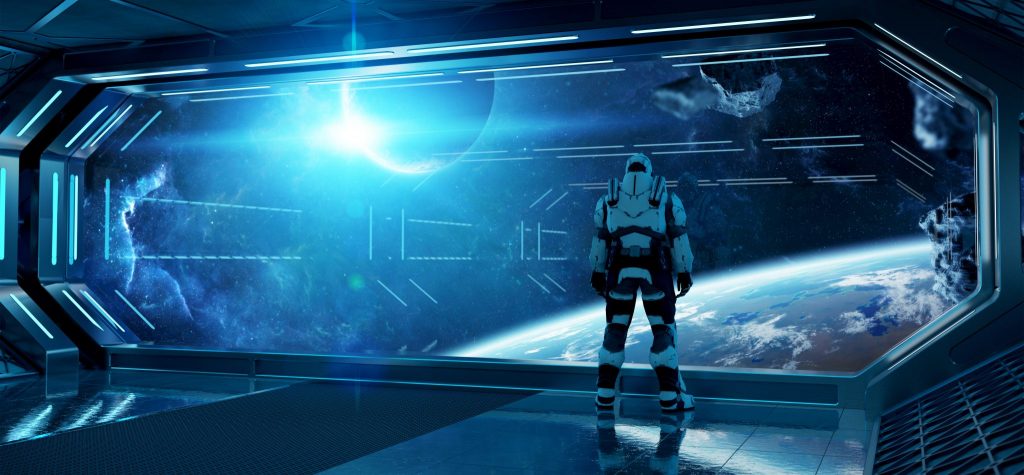What is Military Sci-fi as a genre?
Military Science Fiction (Wikipedia definition): a subgenre of both Science Fiction and Military Fiction, commonly sliding into the Space Opera territory. At its most basic, Military Science Fiction is Science Fiction that focuses on the military, but the genre has more specific nuances than that.
As always, I put my own unique spin on a genre or sub-genre. With the conclusion of my epic fantasy series, The Fabled Quest Chronicles, I wanted to jump back into sci-fi with both feet and all four arms (just kidding). So, I polled my fans again to get feedback on what new genre they’d like to see me write and the result was overwhelmingly in favor of Military Sci-Fi.
This project has an additional hook for me because I served in the US Army myself. What do I imagine the US (or world) armed forces will look like in the far future? What role will the military play in space exploration? What unseen ways will technological advancement transform the military, space exploration, and us?
My Top 10 Themes of My Upcoming Military Sci-Fi Series (Planet Tamers):
1.No warp drive or wormholes, so the interstellar travel thing is out.
I grew up on the original Star Trek and Star Trek: TNG with starships capable of warp drive. However, when you really know the science behind concept of Faster-Than-Light (FTL) propulsion, the “reality” of it falls apart.
I’m not opposed to setting a series in a universe where light-travel is possible, or more precisely being able to travel between solar systems and galaxies with ease. In fact, in my epic fantasy series, different species of elves and other fae do so magically by moving through portals. But will warp speed ever be possible? I say no primarily because of the following scientific reasons:
(a) The organic matter problem
None of the conceivable warp drives can accelerate to speeds faster than light because you would require matter capable of being ejected at speeds faster than light, but no known particles can travel that fast.
Now, I recently re-watched the now regarded as a classic, Galaxy Quest, and the aliens (the Thermians) had a unique way of traveling between galaxies. If we ever could do what the Thermians did—coat the subject (organic matter) in a projective sheath and transport that, though we still have some issues with physics–then maybe.
(b) The energy problem
This one also seems insurmountable. Imagination doesn’t have to deal with physics, but reality does. What’s holding humanity back from even reaching a fraction of the speed of light? In a word, energy. Any object that’s moving has energy due to its motion. Physicists call this kinetic energy. To go faster, you must increase the kinetic energy. The problem is that it takes a lot of kinetic energy to increase speed. To make something go twice as fast takes four times the energy. Making something go three times as fast requires nine times the energy, and so on. There’s your energy problem.
(c) The propulsion problem
Could humans make something go even faster?
Yes! But engineers need to figure out new ways to make things move in space. All rockets, even the sleek new rockets used by SpaceX and Blue Origins, burn rocket fuel that isn’t very different from gasoline in a car.
(d) The fuel problem
The burning of fuel is very inefficient.
What other methods could we use to move a spacecraft? We could use electric or magnetic forces. We could use nuclear fusion, the process that powers the Sun, which is also much more efficient than chemical fuel.
So, sadly those four reasons eliminate warp drive for me and, even sadder, worm holes are not the nifty portals you see in Marvel’s Doctor Strange, or lying around for us to fly a spaceship through to another galaxy.
The concept of “hyper gates” from the sci-fi series Babylon 5 or the “folding of space” from the classic Dune series, is more “believable” to me, but not a reality in my new military sci-fi series. They have some amazing technology, but we’re still confined to solar system for time being. So, let’s just say we humans will “create our own fun.”
2. No aliens
Sorry, no extraterrestrials either. (Well, I think so)
3. Military galore!
We can’t have military sci-fi without the military. In the series, we have Army, Navy, and Marines. No more Air Force or Coast Guard. There’s never a mention of Space Force, but that’s a moot point since everything is in space for the armed services.
4.The “Big Thing” in the series is Terra-forming!
We can’t warp on over to the Rissa or Tatooine, so we’ll create our own planets in our own solar system. The series is very serious about all this as we humans are about to terraform our first planetary body in solar system. Talk about one “big step” for humanity. That would mean becoming a multi-planet species!
For the world-building of this new series, you are stationed with one group most of the time, so what’s happening elsewhere, like Earth, is revealed over time. But I’ll tell you this: Earth doesn’t have a world government. It has many governments, and a lot more factions. Imagine, if you’re not one of those governments that commissioned humanity’s greatest, grandest terraforming mission of all time and space, then you’re probably not too happy. Yes, “Houston we will have a problem.”
5. Dangers (micro): Mental illness and Radiation
There is no doubt that mental illness is a serious problem in this country. It’s hard to say that it’s worse than ever before. What I can say is that we’re not doing much about it, other than talk.
We seem interested in it because of the violence. However, as a veteran, there’s another aspect of it that I have felt very strongly about for decades and has caused my souring on US military leadership. Stuff the politics up your hole; we have a crisis of suicide among our soldiers, sailors, airmen, and marines!
Besides issues related to mental illness in this space exploration series, whether real or perceived, there’s another danger that’s not talked about enough in sci-fi: radiation. With the shield of our Earth’s atmosphere, we have no concept of the endless bombardment of known and unknown radiation flying through space. This radiation includes magnetic fields which can charge and accelerate particles to speeds that can fry the electronics of a spaceship. Imagine, what that could do to a human body, or the human brain. If we become this major space exploration race, as we do in the series, these issues will be pushed to the forefront.
6. Dangers (macro): There is no escaping politics and war
We see all this play out in the series. And yes, there is a Federation, but you don’t want anything to do with this bunch.
7. Relationships
Military comradery in any fiction involving the military is a given. We see the natural tension between different branches of government, and the fact they are all ultimately out of their element as they go from space explorers to terraformers to off-world colonists.
8. Ensemble cast of characters
We remember the main characters and their names, but all the supporting ones and the new ones coming and going is what makes good fiction.
9. Cosmoships
This may be more of a Navy or Air Force thing, though I can definitely relate. Whether Navy sailors aboard a submarine or aircraft carrier, or pilots and their jets in the Air Force, the vessel is like a living, breathing person too. In the series, the characters regard their spaceships as living beings. It’s far more than sentimentality though. These cosmoships are home and the crew will risk their lives to protect them because without them, there is no life for humans in space.
10. A Universe of Cool Tech
Yes, if there’s military soldiers involved, there will be plenty of advanced weaponry, super-suits, and robots to show off. And don’t forget the seemingly god-like machines of the “genesis architects” who will transform a moon into humans’ Earth Two.
What Do You Think?
COMMENT BELOW

Austin Dragon is the author of over 30 books in science fiction, fantasy, and classic horror. His works include the sci-fi detective LIQUID COOL series, the epic fantasy FABLED QUEST CHRONICLES, the international futuristic epic AFTER EDEN Series, the classic SLEEPY HOLLOW HORRORS, and new military sci-fi PLANET TAMERS series. He is a native New Yorker but has called Los Angeles, California home for more than twenty years. Words to describe him, in no particular order: U.S. Army, English teacher, one-time resident of Paris, ex-political junkie, movie buff, Fortune 500 corporate recruiter, renaissance man, futurist, and dreamer.
LATEST RELEASES: CRAZY MISADVENTURES IN LIQUID COOL and A MONSTROUS GAME!





7 Responses
Sounds very interesting. I also understand the military as my father was in the British Army all of his career and I also wanted to join but unfortunately I couldn’t as I lost my right eye when I was 7. Looking forward to see what you come up with
Remember the last part of Sci-Fi is Fiction. You don’t need a working science of anything …just something that could be. I’m sure as we start to explore our solar system we will find minerals that are new and could do new things. If its not there then think it up and …..make it so
A lot of the premise makes sense and finding a super material which would allow for space travel is just one of those boundaries we need to get there as a tech jump.
Ian, you are spot on. Those new minerals (and alloys) allow us to do a LOT of things. Just no warp-drive. But you’ll see.
I love this concept! I like military SciFi, but a light version. I mean, not pages and pages of pew pew. I’m more into a social space opera and I think this is just right for me. I’ve read very few terraforming books and I know I’m going to love this series! It has a great world building, as in, literally.
Thank you so much for defining the plot so thoroughly for us, Austin.
I do like also that you want to base it as realistic as possible, but I’m also in favour of what my fellow reader Ian Robert Jackson mentions above, a little more fiction would be nice along the way. I leave it in your fabulous creative imagination! ☺️
Oh, and preordered at iBooks (Apple).
Thank you for a wonderful insight, Austin! I wish you all the best with this undoubtedly promising series. Looking forward to reading it!
Love and Light.
Meenaz. 🧡🌟
Fascinating topic! I’m curious as to how your crews will be navigating around our galaxy, Austin.
I look forward to anything you write, Austin, but I can’t wait for this! Something a wee bit different from you.